What's new

What supports, and how much, do boomers with chronic diseases need?
Older workers with diabetes or arthritis experience more fatigue and pain. But how different are they from healthy older workers in their need for, and use of, workplace accommodation and supports? An open access IWH study examined this question. It also looked at differences in work outcomes when people have access to supports when they’re needed.

International expert on work precarity and health inequity speaking in Toronto on April 11
Precarious employment is prevalent in low-income countries where as many as three in four workers are employed in the informal economy. Work precarity is also on the rise in high-income countries, where its effects are felt most by young workers, women, migrants and ethnic minorities. On April 11, Dr. Joan Benach, director of the Health Inequalities Research Group at Pompeu Fabra University in Barcelona, Spain, delivers the John R. Evans Lectureship in Global Health. The lecture, co-hosted by IWH, is free and open to the public.

Ontario employers: tell us about your experience hiring newcomers
Employers play an important role in both hiring and subsequently providing safe work environments for recent immigrants. Researchers at the Institute for Work & Health want to understand the opportunities and challenges employers experience regarding work integration of newcomers, and their resource needs to help newcomers stay safe at work. We invite you to help by participating in a research study that examines the experiences and expectations of employers in relation to hiring and training recent immigrants and refugees in Ontario.

Sign up now for IWH’s systematic review workshop in May
Learn how to plan, conduct and communicate the results of a systematic review from the best in the field. Registration is now open for the Institute’s yearly systematic review workshop, taking place May 15-17 in Toronto. Taught by experts from IWH and Cochrane Back and Neck, this three-day workshop is intended for clinical trainees, clinicians, decision-makers, academics and researchers (epidemiologists, statisticians) with a general interest in the methodology of systematic reviews and for those planning to conduct a systematic review in the future. Registration closes April 24 or when the workshop is full.

World Congress 2020 releases first program, opens registration
Connect with global leaders on emerging challenges, innovative solutions and best practices in workplace injury and illness prevention. The World Congress on Safety & Health at Work is coming to Toronto on October 4-7, 2020. Registration is now open, and the first program announcement is now available at the World Congress 2020 website. This global forum, designed for OHS leaders, policy-makers, employers and advocates, is organized by the International Labour Organization and the International Social Security Association, in conjunction with the Canadian co-hosts, IWH and the Canadian Centre for Occupational Health and Safety.

Supportive supervisors help reduce risks when workers face hazards, lack protection
Workers are vulnerable to injuries or illnesses when they're exposed to hazards and lacking protective factors such as OHS policies, awareness or empowerment. However, supportive supervisors can help lower the likelihood of injuries even when workers are vulnerable, according to a new study.

On RSI Day, access your eOfficeErgo training in French
February 28 is International Repetitive Strain Injury (RSI) Awareness Day. To help your workplace raise awareness about safe and healthy workstation practices, the Institute for Work & Health (IWH) brings you eOfficeErgo, an evidence-based and standard-compliant online ergonomics training program designed for people who regularly use computers on the job. In time for RSI Day, this free e-learning program is also now available in French, thanks to the support of l’Association paritaire pour la santé et la sécurité du travail du secteur affaires sociales (ASSTSAS).
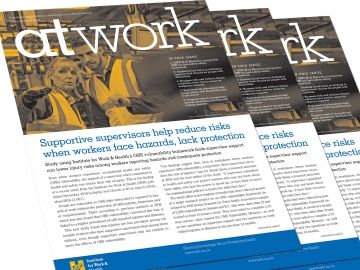
The Winter 2019 issue of At Work is out
In the latest issue of At Work, read about the role supervisors can play in lessening injury risks, even when workers are vulnerable due to hazard exposure and inadequate protection. Learn about a draft pan-Canadian strategy on improving work opportunities for people with disabilities, now being circulated for feedback from a broad cross-section of stakeholders. Also, baby boomers with arthritis or diabetes are not that different from healthy peers in how much they need, or use, workplace accommodations.
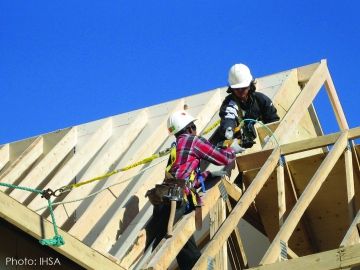
IWH Speaker Series: Evaluating the effectiveness of Ontario’s working-at-heights training standards
Serious injuries and fatalities resulting from falls from heights are a major concern in construction work. In 2015, Ontario’s Ministry of Labour implemented regulations defining working-at-heights training program standards and establishing a program for approving training providers in the province. In an IWH Speaker Series presentation on February 26, Scientist Dr. Lynda Robson shares findings from a study examining the reach and effectiveness of this training initiative.

IWH Updates - Winter 2019
Two post-doc fellows join IWH scientist ranks ~ IWH’s eOfficeErgo available in French ~ Watch for World Congress 2020 program and registration announcements

Progress seen in occupational disease prevention, but data still lacking: speaker
For each person who dies from a work-related traumatic injury, at least six people die from an occupational disease. Many jurisdictions, Ontario included, have disease prevention as a priority, but we need more research and better surveillance systems to push ahead, says the 2018 Nachemson lecturer.

What research can do: SAFE Work Manitoba incorporates IWH tool into safety culture framework
They had a five-year plan with initiatives related to building a culture of safety across Manitoba. But they were missing a definition of safety culture—and a way to measure it. That was when SAFE Work Manitoba turned to IWH expertise.

Better disease, exposure surveillance key to progress on occupational disease prevention: Nachemson lecturer
For every person who dies from a work-related traumatic injury, at least six people die from an occupational disease. Fittingly, preventing the work exposures behind these diseases is a priority in many jurisdictions, including Ontario. But to push forward on this agenda, we need to build up our disease and exposure surveillance systems, Occupational Cancer Research Centre (OCRC) Director Dr. Paul Demers noted in his remarks last November at the 2018 annual Alf Nachemson Memorial Lecture, hosted by IWH. His Nachemson lecture is now available as a slidecast.
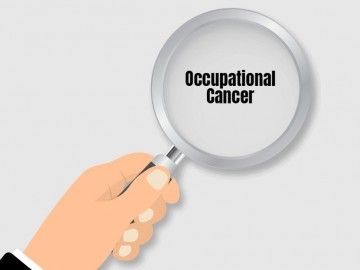
IWH applauds appointment of occupational cancer expert to lead review
The Institute for Work & Health (IWH) congratulates Ontario Minister of Labour Laurie Scott for her appointment of Dr. Paul Demers, director of the Occupational Cancer Research Centre in Toronto, to lead a review of the scientific evidence on the role of workplace exposures in causing cancers among Ontario workers. In a letter to the Minister, IWH President Cam Mustard says he expects the review will have influence in provincial jurisdictions across Canada.

Ontario Mining Association endorses safety climate and assessment audit tool
A tool designed to measure "two sides of the coin"—OHS systems and culture—developed by Workplace Safety North with Institute for Work & Health expertise, has been endorsed by the Ontario Mining Association, and now is in demand well beyond the province and the sector.

Draft strategy on improving employment of people with disabilities now available for feedback
Public consultation is now under way on a draft strategy for building an inclusive workforce—one where people with and without disabilities have the same choices in their jobs and careers. The organizations behind the draft strategy, hosts of the Disability and Work in Canada 2018 conference held last December in Ottawa, are hoping to gather input on the document from as many perspectives as possible.

IWH’s Dr. Nancy Carnide promoted to associate scientist
Congratulations to Dr. Nancy Carnide, who was recently named an associate scientist at the Institute. Previously a post-doctoral fellow at IWH, Carnide was also the recipient of a Canadian Institutes of Health Research (CIHR) Vanier Canada Graduate Scholarship and a CIHR Strategic Training Fellowship in Work Disability Prevention. Her current research interests focus on substance use and mental health problems among working populations.

Manitoba turns to IWH leading indicators in safety culture initiative
It had a five-year plan that included building a culture of safety across the province. What it was missing was a definition of safety culture—and a way to measure any progress made. That was when SAFE Work Manitoba turned to IWH and its work on occupational health and safety leading indicators. In this impact case study, we look at how the IWH Organizational Performance Metric is helping SAFE Work Manitoba achieve its goals.

RTW outcomes improve after WSIB implements two of IWH’s Seven Principles in regional assessment service
In 2013, Ontario’s Workplace Safety and Insurance Board (WSIB) put two of IWH’s Seven ‘Principles’ for Successful Return to Work into practice when it introduced changes to the medical assessment service offered at its Regional Evaluation Centres. The new service integrates return-to-work (RTW) planning and enhances communication among health-care providers, the WSIB and the employer, with the worker’s participation. In a new impact case study, we look at the difference in recovery and RTW outcomes after the changes were put in place.

Institute research on "the big issues" summarized in 2017 annual report
From violence to cannabis legalization to mental illness, policy-makers and occupational health and safety practitioners are challenged to stay on top of emerging societal issues that also affect the workplace. We summarize our research work on these big issues and more in the Institute’s 2017 Annual Report, now available to download.

Helping young adults with disabilities enter the job market
It’s such a crucial time in one’s life, those early years when young adults find their first jobs and start making their way in the working world. For young people with a disabling health condition, it can be a frustrating time of finding barriers at every turn. What programs can help these young adults enter the labour market? In a recent IWH Speaker Series presentation, Dr. Arif Jetha shared findings from a systematic review.

With IWH expertise, OHCOW develops psychosocial screening tool
Ridicule and belittlement, gossip and back-stabbing, unclear job expectations, unfair treatment, relentless work demands. Research shows that psychosocial work conditions such as the above are as serious as any other safety hazard. That was why the Occupational Health Clinics for Ontario Workers (OHCOW) set out to create a tool to help workplaces tackle psychosocial hazards. And IWH was happy to lend its tool development expertise.

Comparing two silica dust prevention methods: a slidecast
Research suggests that 380,000 Canadians are exposed to silica dust at work and, each year, 200 new cases of lung cancer in Ontario can be attributed to silica dust exposure. In this IWH Speaker Series presentation, Dr. Emile Tompa looked at the costs and benefits of two types of silica dust prevention strategies: use of personal protective equipment or use of engineering controls (i.e. the wet method). His presentation is now available as a slidecast.

Should you mostly sit or stand at work? New IWH video has the answer
If you’re confused by seemingly duelling headlines about the negative health effects of prolonged sitting and prolonged standing, we’ve got a video for you. It just so happens that two of the scientists behind these headlines work at the Institute for Work & Health. We put them before the camera, side by side, to sort out the take-away message.
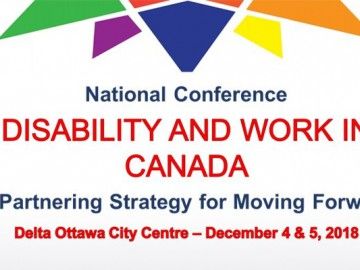
Conference to continue work on national strategy on work and disability
Disability and Work in Canada 2018, taking place December 3-4, 2018 in Ottawa, will engage delegates in reviewing and building consensus around a proposed national strategy to improve the level of employment among people with disabilities in Canada. The conference is being hosted by the Disability and Work in Canada Steering Committee, which includes among its members a number of executive members of the Centre for Research on Work Disability Policy, a pan-Canadian, multidisciplinary research centre established in 2014 and headquartered at the Insitute for Work & Health.

Institute accepting applications for post-doctoral Mustard fellowships in work and health
New researchers with an expertise in social, behavioural, organizational, clinical and/or population health sciences are invited to apply for a post-doctoral Mustard Fellowship in Work & Health. The Institute is looking for recent PhD graduates with an interest in doing research related to one of its two overarching priorities: work as a determinant of health and health as a determinant of work. The deadline for applications is Friday, December 14, 2018.
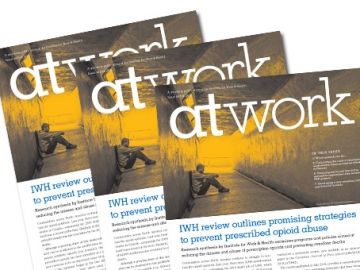
At Work Fall 2018 is out
The Fall 2018 issue of At Work is now available. Inside this issue: promising strategies to reduce the misuse and abuse of prescription opioids, a round-up of the external grants awarded to Institute scientists, the Institute's role in the development of a toxic workplace screening tool, and more. If you didn't get your issue in your inbox, download the PDF here.
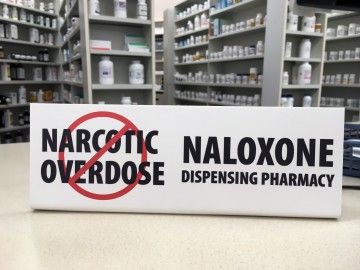
Identifying promising strategies for preventing misuse and abuse of opioids
Since the start of the opioid crisis in the late 1990s, communities across North America have tried many different strategies to curb the misuse and abuse of prescription opioids. In an open-access systematic review, an IWH team analyzes the effectiveness of the studied strategies, identifies the most promising ones, and points out unintended consequences.

IWH Updates - Fall 2018
IWH’s Dr. Peter Smith named to executive team ~ Announcing 2018/19 Syme fellows ~ Conference to review strategy on improving work opportunities for people with disabilities

What research can do: Drawing on IWH’s Seven ‘Principles’ in return-to-work policies, practices
The Seven 'Principles' for Successful Return to Work is far and away the most downloaded item on the IWH website. We tracked down a few examples of how it has been used by workplaces and clinical practitioners.

IWH Speaker Series—November 20: Clearing the haze on at-work cannabis use and perception
Recreational cannabis is now legal in Canada and many employers are concerned about the potential implications for workplaces. In this IWH Speaker Series presentation, Dr. Nancy Carnide shares early findings of a survey, conducted in June 2018, on patterns of cannabis use at work and workers' perceptions of such use.
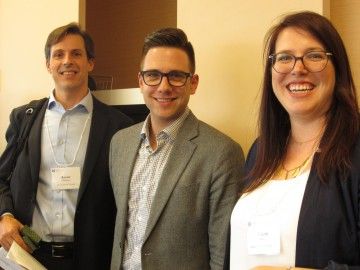
SSHRC/CIHR partnership grant funds research into accommodating workers with chronic conditions
Health conditions such as depression, Crohn’s disease and HIV have at least one thing in common. People with these conditions can be in good health for long periods of time and then experience bouts of debilitating symptoms. These recurring and hard-to-predict episodes can make asking for, and providing, workplace accommodation a challenge. Now, Dr. Monique Gignac is leading research aimed at making conversations around accommodation easier, thanks to funding from the Social Sciences and Humanities Research Council (SSHRC) and Canadian Institutes of Health Research (CIHR).